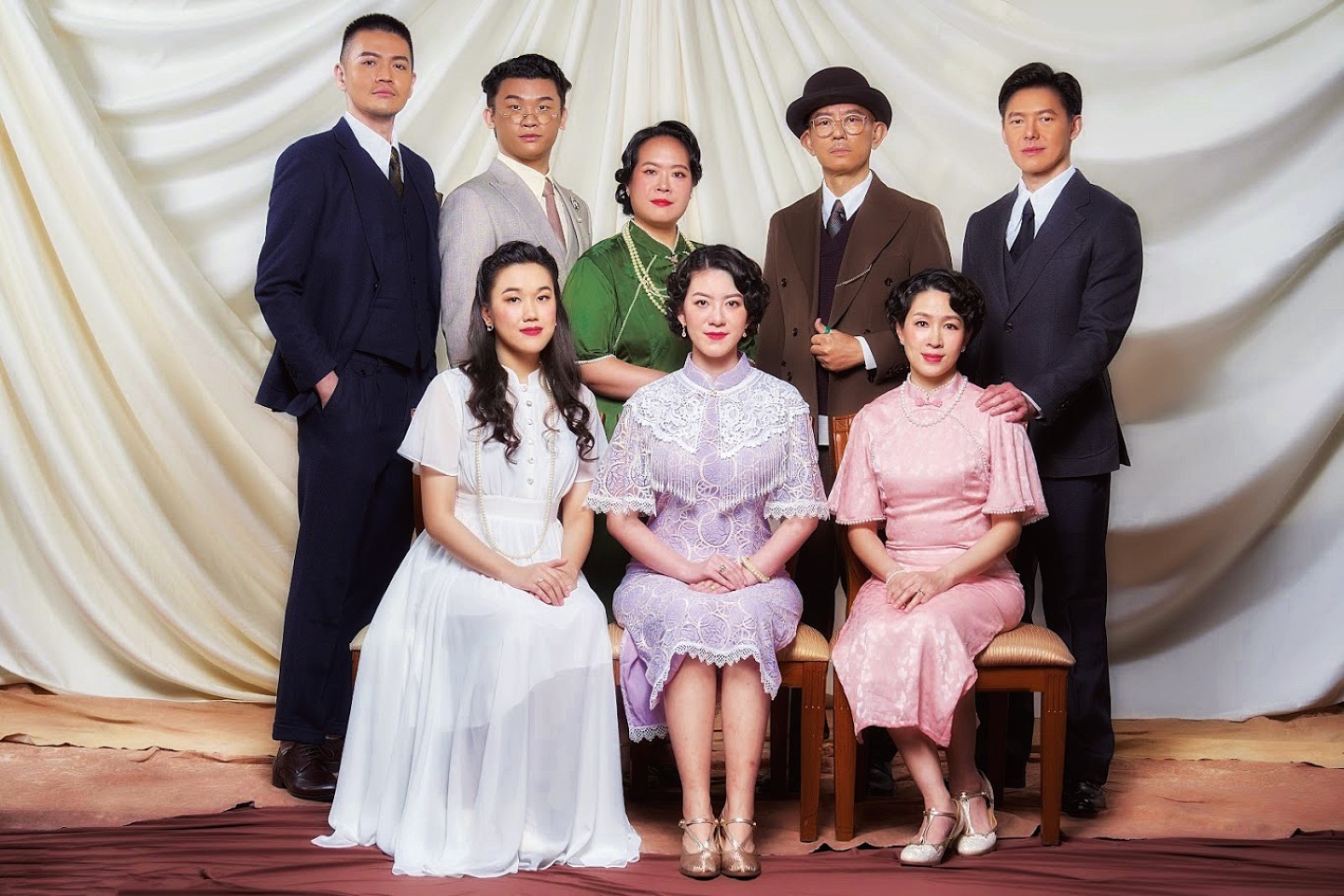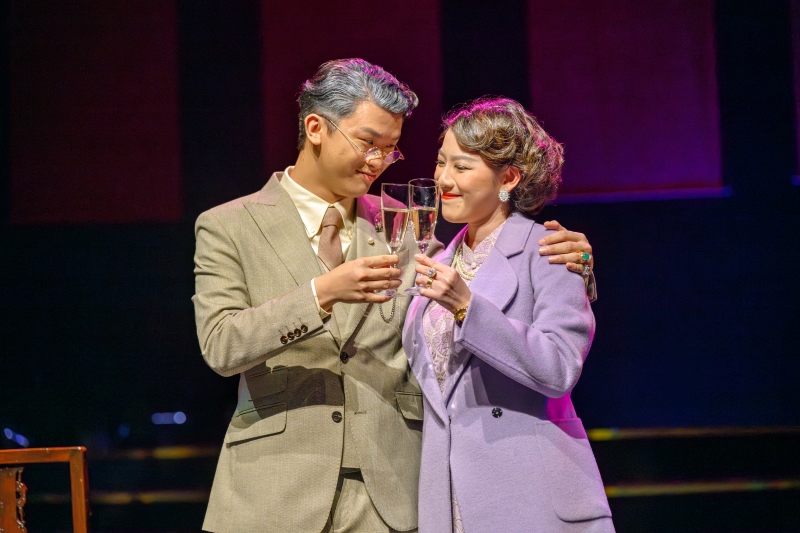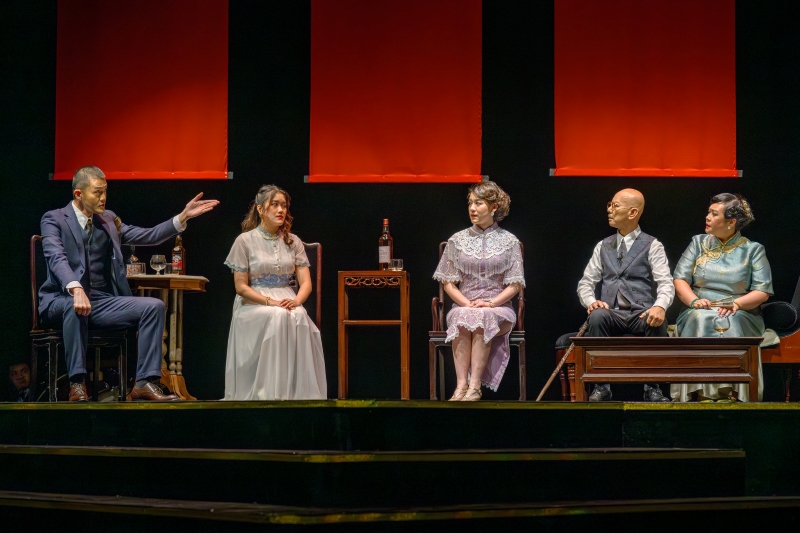
The cast of The Sisters Soong, which is about wealth, politics and three women caught up with changes in 1900s China (Photo: Tat Chin)
Three of the wealthiest, most powerful women in 1900s China married prominent men in politics and helped shape the course of its history at a time of political turmoil.
“They were rolling in it, you know, but I think their stories were not all that pure. The lives of the Soong sisters are tailor-made for theatre — they have all the elements,” says director and producer Datuk Faridah Merican, whose dream of staging a show about the siblings was postponed countless times by the pandemic.
“She saw the film [by Hong Kong director Mabel Cheung, in 1997], read several books and fell in love with them and then said, ‘I want to do the play’,” recalls Joe Hasham, who co-founded The Actors Studio (TAS) with Faridah, his wife, in 1989. “Of course, there’s no play. So, she asked me to write it.”
And he did. One half of The Sisters Soong is fictional and the other, factual, “but there’s nothing in there that is not historically correct”, adds Faridah, who is directing a work by Joe for the first time in more than 30 years. “There’s a lot in terms of their day-to-day activities, what they did and said. The whole truth is there of them and their relationship with their husbands, and father and mother.”
Father Charlie Soong was a Hainanese merchant who made his name and fortune in Shanghai publishing Chinese-language Bibles and doing other forms of business. With his modern ideas about revolution and the role of women, he sent his daughters to Wesleyan College in Georgia, the US. Mother, Ni Kwei-tseng, came from a family of scholars and government officials and was all for educating their girls too.
20240815_peo_dr_faridah_merican_joe_hasham_oam_klpac_zhd-542.jpg

An often-used quote about the Soong sisters says, “One loved money, one loved power and one loved her country”. The eldest, Ai-ling (1890-1973), worked as a secretary for Dr Sun Yat-sen, leader of the Chinese Nationalist Party, before marrying prosperous banker and businessman H H Kung, Minister of Finance from 1933-44, whose ancestry can be traced back to Confucius.
Ching-ling (1893-1981) wed Sun, who overthrew the Qing dynasty and established the Republic of China in 1911. After Sun’s death in 1925, she joined the Chinese Communist Party and was elected Vice Chair of the People’s Republic of China. This “Red Sister” became known as the “Mother of Modern China”.
Youngest sister Mei-ling (1897-2003) was the second wife of nationalist leader Chiang Kai-shek, who succeeded Sun. Named Person of the Year alongside her husband in 1937 by TIME magazine, she was hailed for being instrumental in winning US support for China’s war against Japan.
The Sisters Soong retells their stories at the Kuala Lumpur Performing Arts Centre, starting Aug 31, with live music, song and dance “to make it lighter and more enticing for local audiences because the story is very dark and deep. The sisters were quite amazing. At one stage, they were like the three most powerful women in the world, not just China”, says Joe, who co-founded klpac with Faridah. They are its artistic director and executive producer, respectively.
“Those who know the Soongs’ story might think, ‘What is this?’ because the play is very different in tone and manner from how the sisters actually lived. But we tell their story truthfully, through a series of virtually six monologues that encapsulate their lives, highlighting the moments that mattered and were dramatic.”
457142462_1038935641568919_7539721089182289665_n.jpg

There are succinct scenes on how the husbands feel about their famous wives, and vice versa — not everything is a bed of roses — and a meaningful one between Charlie and Ni that shifts the focus from the children and their fighting one another.
Charlie Soong had a very forthright, strong personality. His relationship with his daughters was epic, as was his close friendship with Sun. When Ching-ling married him, “all hell broke loose. Those moments are in the film and the play”, Faridah adds.
These parts are narrated by Omar Ali, as well as the sisters. Chinese proverbs, mainly expressed in Mandarin, have been slipped in to add meaning to the story.
Playing the key roles are Season Chee as Charlie, Ruby Yap (Ai-ling), Jerry Pang (Kung), MayJune Tan (Ching-ling), Dennis Lee (Sun), Jane Tee (Mei-ling), Tan Li Yang (Chiang), Priscilla Wong (Ni) and Xavier Chen (as Celebrant).
Yusman Mokhtar is behind the scenography and fashion couturier Beatrice Looi, the costumes. Tan Zhi Yong’s original compositions and arrangements are played by an ensemble of 10 musicians, led by Lee Kok Leong. Jessie Yong sings Amazing Grace after the narrator talks about Mei-ling’s US ties and George W Bush’s statement on her passing.
soong_sisters_1.jpg

Choreographer Kenny Shim created a tango, performed by two women, and a waltz to represent the sisters’ lifestyle. “What I was very captivated about is we have brought out not just these historical figures; we see them as humans in the show.
“The dances, which blend seamlessly with the acting, amplify that to give a sense of the things they do outside of their daily [routine]. These form an overarching narrative to engage the audience, not just through sound and text, but kinaesthetic energy too,” adds Shim, also a dance educator, who grew up watching plays by Faridah and Joe and looks to them as icons in the industry.
Among the young cast are students from Aswara (the National Arts Cultural Academy) and Tutas (Taylor’s University and TAS’s performing arts degree programme), who probably think the same way.
Faridah, who will be 85 in October, says she feels “really good about directing young people. I love watching them … It makes me feel young too. I don’t want to lose the spirit I have for theatre. I want to carry on doing what I can.
“I want to say something that will probably make you think, ‘These people are crazy!’ We’ve done so much theatre together, Joe, myself and other people. This is one of those rare occasions when we are involved in a piece of work that has left us enjoying ourselves so much during rehearsals, laughing and loving each other.”
soong_sisters_2.jpg

Joe’s initial concern about English not being the mother tongue of most of the actors has turned to charm. “At rehearsals, when I started to listen to them and hear their English being so real coming out of their mouths, I fell in love with them. I think, honestly, with this play in particular, we’ve been super blessed.”
“We’re so happy doing it,” Faridah pipes in. “God willing, we’ll be happy right to the very end and make profit. I mean, we can do everything else very well but selling tickets is one of the most difficult.”
They are grateful to theatregoers who frequent shows and cast and crew who have stayed with the company over the years, as well as corporate sponsors who support the arts, such as Sime Darby and YTL Corporation. The former stepped in when TAS was facing a tough time in 2012 and has not left. The latter joined hands with the company to set up klpac in 2005, two years after floods destroyed its base at Plaza Putra’s underground complex in KL.
“But the government is not helping [the arts] and this is so painful,” Faridah laments. There’s so much more to do, really, like revive traditional theatre, which is in dire straits because there’s no support of the makyong, wayang kulit, boria and all that.
“These have to come back because, if they don’t, where are the cultural roots that we talk about that our country is proud of — the Chinese, Kadazan, Iban, Bidayuh and Indian? They may one day disappear and we don’t want that to happen.”
'The Sisters Soong' runs until Sept 8 at Pentas 1, klpac. There will be post-show talks on Sept 1 and 8 detailing its creation, the talents involved and what it took to bring the production to life. Tickets from RM78 to RM188 are available via cloudjoi.com.


